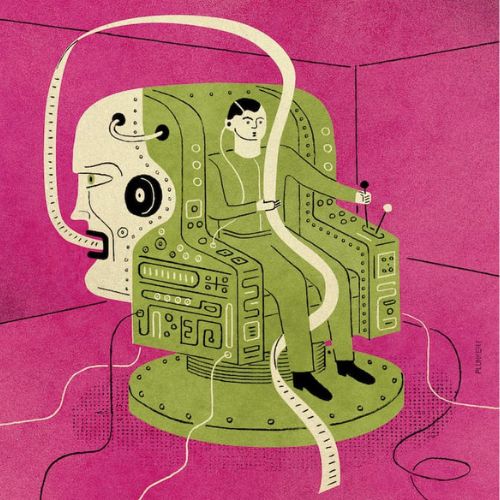Every few months a new study confirms what social media tells us every day: Democrats and Republicans no longer like each other much. Some partisans say they won’t date someone from the other party. Others claim they’d disapprove if their child married across party lines.
Now two professors in the Seidner Department of Finance at the Carroll School of Management have shown the business world isn’t exempt from America’s partisan fever. Business people too are shying from interacting with their political opposites.

Professor Vyacheslav (Slava) Fos
In a working paper, Professor Vyacheslav (Slava) Fos, a Hillebrand Family Faculty Fellow, and two colleagues have found that the executive management teams of large American public companies have become more politically homogeneous. Sitting around a conference table has become yet another activity Americans won’t do with political opponents.
Professor Ran Duchin has identified a practical outcome of the partisan pique—companies have become less likely to merge across party lines. Duchin, the Coughlin Family Professor, and three co-authors show, in a working paper, that companies where employees mostly donate money to one party have become less likely to combine with ones where employees mostly give to the other.
Simply put, in mergers and acquisitions, Republicans prefer to pair up with fellow Republicans, and Democrats with fellow Democrats. What matters these days isn’t whose product lines complement yours, but who shares your views on the right to bear arms.
Both professors’ research was recently highlighted in The Economist, and the findings come as a surprise to those who believed that people were less likely to let partisanship color their dealings in business than in their personal and family lives. One would think that businesses aim to identify and exploit profitable markets, not let their partisan flags fly. A co-worker’s or merger partner’s MAGA hat should matter less than that person’s contribution to the bottom line.
But executives aren’t just their jobs—they’re American citizens (or at least residents), and they’re living in a politically rancorous time. Political scientists have shown that American politics has become more driven by emotion and identity than policy disagreements. This phenomenon, called affective polarization, fuels hostility. (Interestingly, it’s not unique to the United States—the move toward affective polarization has been documented throughout the world.)
“What matters these days isn’t whose product lines complement yours, but who shares your views on the right to bear arms.”
Still, Fos says he was surprised that corporate executives couldn’t set aside politics. “I’d imagine that executive teams would be the last place where people would put party interests ahead of everything else,” he says. “If someone’s the most talented person, that person should work for the company,” regardless of party allegiance.
Yet Fos and his co-authors show that politics is driving out some presumably talented folk: An executive is more likely to leave a firm if he or she belongs to the minority party there. Managers must be fine with this—they’re letting it happen—but shareholders aren’t. The researchers document that a company’s stock drops when a “misaligned executive” departs. “The incremental losses to shareholders around the departures of executives who are politically misaligned with their team amount to more than $200 million for the average firm in our sample,” they write.
Fos and his colleagues studied executive teams from 2008 to 2020 and will soon be updating their paper with additional data showing that “the polarization we describe was even stronger during 2021 and 2022,” he said. The researchers measured partisanship as “the probability that two randomly drawn executives from the same team are affiliated with the same political party,” using voter registration records to identify party affiliation.

Professor Ran Duchin
Their study didn’t address why management teams have become more partisan, but Fos suspects “people feel uncomfortable being around people of different political views.” That discomfort may stem from disagreements—about, say, likely economic outcomes or prudent corporate policies, given who occupies the White House or controls Congress, he says. Whatever the reason, executives of differing political views have become less likely to find the common ground needed to collaborate.
Collaboration matters in mergers. No corporate decision requires such intense, high-stakes interaction between two executive teams. Duchin’s research shows politics is inhibiting cooperation there too.
Duchin and his co-authors gathered data from 1980 to 2018 to assess the partisan bent of US public companies. To depict each firm’s partisanship, they identified employees via LinkedIn and matched their profiles to voter registrations. They also collected information on the campaign contributions of employees and all residents of the state where the firm is headquartered.
The researchers then calculated a firm’s political affiliation “as the average of (1) the number of a company’s employees, identified through LinkedIn, that are registered as Democrats, divided by its total number of employees registered as Democrats or Republicans; and (2) the number of individual employees’ political donations to Democratic committees divided by the total number of donations to both Democratic and Republican committees in the past two presidential election cycles.”
An interesting feature of this setup is that it captures the partisanship of all employees who donate, not just the executives.
In other words, the sample represents everyone participating in post-merger integration activities—the lawyers, accountants, and supply-chain managers who must collaborate with counterparts at another company. Duchin and his co-authors hypothesize that differences in employees’ politics can cause integrations to go awry.
“In my view, polarization has created mistrust. If counterparties don’t trust each other, they can’t reach a deal.”
That matters because executives often tout the potential synergies of mergers. As the researchers note, “Since 88% of the mergers in the sample make some reference to integration, political distance is more often than not an economically meaningful predictor of merger formation.” If people can’t cooperate, synergies can’t emerge.
“In my view, polarization has created mistrust,” Duchin says. “If counterparties don’t trust each other, they can’t reach a deal.”
Mistrust thus has become a friction that executives must weigh when considering a deal. The fact that Duchin and his co-authors find that mergers become less likely as the political distance between firms increases suggests that, in many cases, executives are passing on mergers that otherwise make sense. “Even though operationally or financially there are synergies, you may still not merge because the integration costs are so high,” he says. Lawyers and investment bankers are likely advising executives accordingly: cross-party mergers will be too fraught to be worthwhile.
Duchin believes education has a role in helping calm America’s partisan angst. Universities need to ensure they’re forums for robust but civil discourse on difficult political questions. “We have to say that on campus it’s OK to have sensitive political discussions,” he says. By learning to disagree civilly, students will learn a life skill they can apply on the job.
Fos, for his part, sees learning as an antidote too—but in the boardroom, not the classroom. He says his results about the increasing political homogeneity of executive teams suggest that US companies are engaged in a giant natural experiment. Some teams are choosing to be more Republican, some more Democratic, and some are still trying to balance the two.
“With the passage of time, we’ll see who’s wrong and who’s right,” he says. “And we’ll see how the more politically diverse executive teams perform compared to the more homogeneous ones. It may be painful, but we will learn.”






